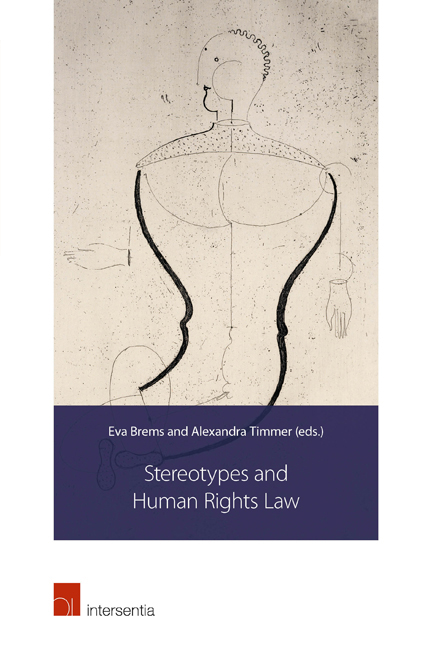Book contents
- Frontmatter
- Contents
- Introduction
- Building Momentum Towards Change. How the UN's Response to Stereotyping is Evolving
- Gender Stereotyping in Domestic Violence Cases. An Analysis of the European Court of Human Rights’ Jurisprudence
- Gender Stereotyping in the Case Law of the Inter‑American Court of Human Rights
- ‘My Sense of Humanity Has Gone Down the Drain’. Stereotypes, Stigma and Sanism
- Racial Stereotypes and Human Rights
- The Head of the Woman is the Man. The Failure to Address Gender Stereotypes in the Legal Procedures around the Dutch SGP
- Gender Stereotyping in the Military. Insights From Court Cases
‘My Sense of Humanity Has Gone Down the Drain’. Stereotypes, Stigma and Sanism
Published online by Cambridge University Press: 22 December 2017
- Frontmatter
- Contents
- Introduction
- Building Momentum Towards Change. How the UN's Response to Stereotyping is Evolving
- Gender Stereotyping in Domestic Violence Cases. An Analysis of the European Court of Human Rights’ Jurisprudence
- Gender Stereotyping in the Case Law of the Inter‑American Court of Human Rights
- ‘My Sense of Humanity Has Gone Down the Drain’. Stereotypes, Stigma and Sanism
- Racial Stereotypes and Human Rights
- The Head of the Woman is the Man. The Failure to Address Gender Stereotypes in the Legal Procedures around the Dutch SGP
- Gender Stereotyping in the Military. Insights From Court Cases
Summary
It is impossible to meaningfully consider the power of stereotypes in mental disability law without considering the pernicious power of ‘sanism’: an irrational prejudice of the same quality and character of other irrational prejudices that cause and are reflected in prevailing social attitudes of racism, sexism, homophobia and ethnic bigotry. Sanism pervades and infects every area of mental disability law, be it civil or criminal, or domestic or international. Based on stereotypes and stigma, it explains our laws and our court rulings on commitment law, right to treatment law, right to refuse treatment law, deinstitutionalisation law, antidiscrimination law, the whole range of criminal law issues, from competency determinations to the insanity defence to sentencing to the death penalty, and to such important meta-issues as adequacy of counsel. In the context of international human rights law, sanism is also the key to the way that mental disability law is (or is not) applied worldwide, a factor that has grown since the ratification of the UN Convention on the Rights of Persons with Disabilities (CRPD).
There are seven major points to be considered in the context of stereotyping and human rights law in the context of persons with mental disabilities:
Stereotypes, by typifying in negative ways, especially in their implicit (and sometimes explicit ways of characterising certain persons as ‘less than human’), necessarily limit the enjoyment of human rights.
Because persons with mental disabilities are regularly dehumanised, they are frequently treated in the courtroom in ways that do not comport with dignity.
Whenever an anti-discrimination law is proposed, these invidiousness stereotypes emerge, and inevitably alter and infect the ensuing debate. Often, the resulting laws reflect this.
We have done an extraordinarily poor job of answering the question that has bedevilled civil rights activists since the 1950s: how to capture ‘the hearts and minds’ of the public so as to best insure that statutorily and judicially articulated rights are incorporated – freely and willingly – into the day-today fabric and psyche of society?
Litigators should aggressively and affirmatively take test cases that involve such stereotypes to the regional courts/commissions on human rights, so as to seek explicit pronouncements that official perpetuation of such stereotypes violates international human rights law.
- Type
- Chapter
- Information
- Stereotypes and Human Rights Law , pp. 95 - 118Publisher: IntersentiaPrint publication year: 2016
- 1
- Cited by



